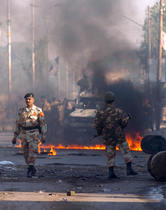“The assassination of Benazir Bhutto has left a huge political vacuum at the heart of this nuclear-armed state, which appears to be slipping into an abyss of violence and Islamic extremism. The question of what happens next is almost impossible to answer, especially at a moment when Bhutto herself seemed to be the only answer.” “Musharraf may not survive the fallout of Bhutto’s death. His actions have not been honorable, and none of the political opposition is willing to sit down with him. It is unlikely that they will accept Musharraf’s continued presidency.  Ahmed Rashid’s Washington Post column on what happens next in Pakistan is an absolute must read. As Rashid puts it,
Ahmed Rashid’s Washington Post column on what happens next in Pakistan is an absolute must read. As Rashid puts it,
The West would also do well to bear in mind Rashid’s warnings about the likelihood that this crisis could break Musharraf’s grip on power:
If rioting and political mayhem worsen, if the opposition refuses to cooperate with Musharraf and the United States finally begins to distance itself from him, then the army may be forced to tell Musharraf to call it a day. If that happens, it will be even more urgent that the world support a national government, elections and a speedy return to civilian rule — and not another military dictatorship.” The strong man might be a convenient solution in the short term. But time and time again, modern history teaches us that it simply stores up–and exacerbates–problems in the long term. Think how much more strategic flexibility Britain and America would have now if they had not put all their eggs in Musharraf’s basket from 2002 to 2006.







Comments